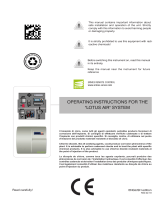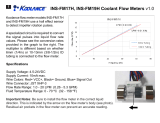
19
AMS IS
Proportional/constant pump driven by a digital signal. Setting the switch on the constant position, the pump has the
same features and adjustments of the CL pump. Setting the switch on the proportional position, to each external voltage
free pulse correspond a magnet stroke. When proportional position is set, the % marked knob does NOT affect the pump
capacity. The IS proportional dosing pump can be driven by any external device (PCs, PLCs, etc.) that produce a digital
signal. The digital signal (N.O. contact) must be applied to the cable provided with the pump, already internal connected. If
it is requested a 0÷5; 0÷12 Vdc input signal option, be care to connections: red wire: positive (+); black wire: negative (-).
AMS PV
Proportional/constant pump driven by a water meter digital signal. Setting the switch on the constant position, the
pump has the same features and adjustments of the CL pump. It is furthermore possible to divide the maximum magnet
strokes per minute by 1, 10 and 100 using the switch on the front panel. Setting the switch on the proportional position,
to each external pulse correspond one pump stroke. This pump can be driven by a CTFI or CWFI series water meters. This
pump can also be driven by a digital signal coming from a voltage free contact. Driving signal is applied on the BNC plug
on the left bottom of the front cover. Dividing factor (N) value is obtained multiplying the value indicated on the adjustment
knob by the multiplying switch (x1, x10, x100) value.
Capacity definition for “AMS PV” pump
Given the water m3 to be treated and the product amount to dose in p.p.m., the minimum pump capacity to be used can
be obtained with the following formula:
ppm x K x m3
——————————————— = l/h
1000
l/h - minimum pump capacity required
ppm - product amount to dose in p.p.m. (gr/m3)
k - dosed product dilution factor (pure chemical k=1)
m3 - maximum capacity of the system to be treated in m3 /h.
Dividing factor (N) to be set on the adjustment knob is given by the following formula:
imp/l x cc
( ———————————— ) x 1000 = N
ppm x K
N - is the number the external pulses are divided by to be set on the adjustment knob
imp/l- pulse per liter given by the water meter
cc - pump’s single stroke dosing quantity (in cc). Refer to following table
k - dosed product dilution factor (pure chemical k=1)
ppm* - product amount to dose in p.p.m. (gr/m3)
* 10.000 ppm equals to 1%























